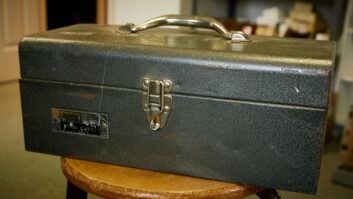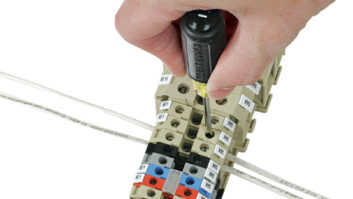‘We like to say that we’ve got Howard Stern upstairs and Sir Isaac Stern downstairs.’
Beethoven.com bills itself as “The World’s Classical Music Station.” However, perhaps a more appropriate title would be “Dot.com Crash Survivor.”
The site has managed to stay afloat since 1999, when it first became a commercial Internet radio station. Today, this classical music Webcaster is breaking even through a combination of smart budgeting, canny ad deals and persistence.
(click thumbnail)Promotions and Program Director Nicole Marie works in the Beethoven Radio studio.
“We’re just waiting for advertisers to discover Internet radio the way they discovered terrestrial radio 70 years ago,” said Alan Tolz, group vice president of Marlin Broadcasting, which owns Beethoven.com. “We don’t know when this is going to happen, but at least we have the staying power to wait.”
History
Beethoven.com was originally the Web site for Miami classical music station WTMI(FM). However, by the time Marlin Broadcasting sold WTMI to Cox Radio in 2000, Beethoven.com had evolved into a bona fide Internet radio station, one with its own programming, online identity and Web-based ad sales.
This said, Marlin Broadcasting’s managers knew the market was not ready to support commercial Webcasting; especially after the dot.com crash in 2000. This is why they moved Beethoven.com’s operations to Hartford, Conn., not far from where Marlin owned WCCC(AM) and WCCC(FM). Then, in a “man bites dog” reverse, the AM was renamed WTMI and turned into a terrestrial rebroadcaster of Beethoven.com’s Internet feed.
“Had we not found a way to link Beethoven.com to a terrestrial radio station, we would have had to run it with a skeleton crew,” said Tolz. “However, by rebroadcasting our Web feed over WTMI(AM)’s 500-watt signal, we could use the same staff to program the site and the station.
“Since WCCC(AM) had been doing little more than relaying WCCC(FM) at the time, we didn’t lose anything by making this switch. In fact, we’ve been able to pick up some new advertisers, because West Hartford is home to some affluent communities that belong to the classical music demographic.”
Technology
Today, Beethoven.com and WTMI(AM) operate out of studios in the basement of a two-story heritage house in West Hartford, while WCCC(FM) runs out of the second floor.
“We like to say that we’ve got Howard Stern upstairs and Sir Isaac Stern downstairs,” quipped John Ramsey, Marlin’s chief technical officer. Beethoven.com’s music feed is produced using Harris Impulse consoles, CD players and a BE AudioVault digital storage system. It is mixed in live assist mode from 6 a.m. to 8 p.m. Eastern – “to serve our listeners during all national day parts, ” Ramsey said – and in automated mode the rest of the time.
Encoding this feed for the Web is not complicated. “We simply send it through a digital encoder to convert it into two feeds, which then goes out from our studio via two redundant, separately routed T-1 lines,” Ramsey said. “This ensures that if one of our phone lines is affected by ‘backhoe drop-out,’ our signal will still get out via the other one.”
The two feeds – 21 kbps and 96 kbps – go to separate companies. The 21 kbps is delivered to local ISP Veranet, which serves it out free to 4,000 users at a time. Meanwhile, the 96 kbps is sent to RealNetworks, where it is sold as part of Real’s paid subscription services.
“We get a share of Real’s subscription revenues,” said Tolz. “They also cover the bandwidth costs for the 96 kbps distribution, whereas we have to pay for every single user who logs on via 21 kbps.”
Making money
Alan Tolz estimated that Real pays about $1,500 a month to Beethoven.com. Although not a princely amount, it helps cover a portion of the combined Webcaster/AM station’s $6,500 monthly budget. Among these costs are Beethoven.com’s bandwidth fees – it has to pay for each listener who connects to a 21 kbps stream – and “performance payments” on a per-user basis to the RIAA.
“We make money from local advertising on WTMI(AM), and about $1,000 a month from ‘click-throughs’ on our banner ads,” Tolz said. “Every time someone clicks on one of our banner ads, it takes them to the advertiser’s site. We get paid when this happens.”
Beethoven.com has shopping links on its site for CDAmigo (CDs), the Chopin Mall (branded clothing, mugs and gifts) and Naxos (CDs). Naxos is an important partner because it waives performance fees for any Naxos-owned music played on the site.
“Although we play music from other labels – especially because 80 percent of our selections are generated through listener e-mail requests – we use the Naxos library whenever possible,” said Tolz. “This helps keep our performance fees down.”
Waiting for the wave
By pairing Beethoven.com with WTMI(AM), generating subscription revenues through RealNetWorks, selling banner ads and striking a deal with Naxos, Marlin Broadcasting apparently has managed to make Webcasting a break-even proposition. As a result, when advertisers finally grasp the value of Webcasting, Beethoven.com hopes to be ready to offer the audience they’re looking for.
Until this happens, “we’re treading water,” Tolz said. “We may even have to cut back on some of our streams to keep our costs under control. This said, we just increased from 2,000 to 4,000 streams, to keep up with listener demand. Maybe we can motivate some of them to subscribe through RealNetworks.”












